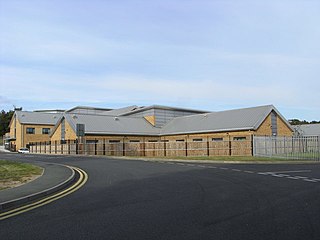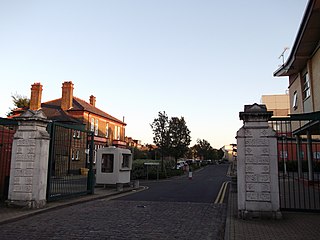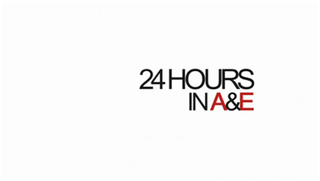Related Research Articles

Bethlem Royal Hospital, also known as St Mary Bethlehem, Bethlehem Hospital and Bedlam, is a psychiatric hospital in Bromley, London. Its famous history has inspired several horror books, films, and TV series, most notably Bedlam, a 1946 film with Boris Karloff.

King's College Hospital is a major teaching hospital and major trauma centre in Denmark Hill, Camberwell in the London Borough of Lambeth, referred to locally and by staff simply as "King's" or abbreviated internally to "KCH". It is managed by King's College Hospital NHS Foundation Trust. It serves an inner city population of 700,000 in the London boroughs of Southwark and Lambeth, but also serves as a tertiary referral centre in certain specialties to millions of people in southern England. It is a large teaching hospital and is, with Guy's Hospital and St. Thomas' Hospital, the location of King's College London School of Medicine and one of the institutions that comprise the King's Health Partners, an academic health science centre. The chief executive is Dr Clive Kay. It is also the birthplace of Queen Camilla.

Rajendra 'Raj' Persaud is an English consultant psychiatrist, broadcaster and author of books about psychiatry. He is known for raising public awareness of psychiatric and mental health issues in the general media, has published five books and received numerous awards.

The Institute of Psychiatry, Psychology & Neuroscience (IoPPN) is a centre for mental health and neuroscience research, education and training in Europe. It is dedicated to understanding, preventing and treating mental illness, neurological conditions, and other conditions that affect the brain. The IoPPN is a faculty of King's College London, England, and was previously known as the Institute of Psychiatry (IoP).

The Maudsley Hospital is a British psychiatric hospital in south London. The Maudsley is the largest mental health training institution in the UK. It is part of South London and Maudsley NHS Foundation Trust, and works in partnership with the Institute of Psychiatry, King's College London. The hospital was one of the originating institutions in producing the Maudsley Prescribing Guidelines. It is part of the King's Health Partners academic health science centre and the National Institute for Health and Care Research (NIHR) Biomedical Research Centre for Mental Health.

A mental health trust provides health and social care services for people with mental health disorders in England.

St Luke's Hospital for Lunatics was founded in London in 1751 for the treatment of incurable pauper lunatics by a group of philanthropic apothecaries and others. It was the second public institution in London created to look after mentally ill people, after the Hospital of St Mary of Bethlem (Bedlam), founded in 1246.

South London and Maudsley NHS Foundation Trust, also known as SLaM, is an NHS foundation trust based in London, England, which specialises in mental health. It comprises four psychiatric hospitals, the Ladywell Unit based at University Hospital Lewisham, and over 100 community sites and 300 clinical teams. SLaM forms part of the institutions that make up King's Health Partners, an academic health science centre.
Pamela Jane Taylor is a British psychiatrist and academic, who specialises in the links between psychosis and violence, and mental and physical health in the criminal justice system. Since 2004, she has been Professor of Forensic Psychiatry in the Department Institute of Psychological Medicine and Clinical Neurosciences of Cardiff University.
King's Health Partners is an academic health science centre located in London, United Kingdom. It comprises King's College London, Guy's and St Thomas' NHS Foundation Trust, King's College Hospital NHS Foundation Trust and South London and Maudsley NHS Foundation Trust.

Lambeth Hospital is a mental health facility in Landor Road, South London. It was previously known as the "Landor Road hospital" and is now operated by the South London and Maudsley NHS Foundation Trust and is affiliated with King's College London's Institute of Psychiatry. It is also part of the King's Health Partners academic health science centre and the National Institute for Health and Care Research (NIHR) Biomedical Research Centre for Mental Health.

Edward Adamson was a British artist, "the father of Art Therapy in Britain", and the creator of the Adamson Collection.

24 Hours in A&E is a British factual medical documentary programme, airing on Channel 4, set in a teaching hospital in inner London. Initially it was filmed in King's College Hospital in Denmark Hill, Camberwell, but in the seventh series, the setting was changed to St George's Hospital in Tooting, Wandsworth. For season 30 the setting changed again, this time moving out of London to Queens Medical Centre in Nottingham. Cameras film round the clock for 28 days, 24 hours a day in A&E. It offers unprecedented access to one of Britain's busiest A&E departments.

Ulrike Hermine Schmidt is a British psychiatrist at the Institute of Psychiatry, Psychology and Neuroscience, King's College London in London, where she is Professor of Eating Disorders as well as the Head of the Section of Eating Disorders. Schmidt is a consultant at the Eating Disorders Service within the South London and Maudsley NHS Foundation Trust. Schmidt is known for her ground breaking work helping people with eating disorders and their clinicians.
The Maudsley Prescribing Guidelines is a referenced prescribing guideline for psychotropic drugs.

The Bethlem Gallery is an art gallery in Beckenham, Bromley, England. It was established in 1997 to support and exhibit artists who are current or former patients of the South London and Maudsley NHS Foundation Trust. The gallery is housed in an Art Deco building shared with the Bethlem Museum of the Mind, with exhibits about the history of Bethlem Royal Hospital.

Bethlem Museum of the Mind is a museum focusing on the history of Bethlem Royal Hospital, its programme of care, and its patients. Opened in 2015, the museum is housed in an Art Deco building shared with the Bethlem Gallery, which hosts exhibitions of contemporary artists who are current or former patients.

David Nath is a British producer and director, best known for his work on television documentaries.
Shubulade Smith, also known as Lade Smith is a British academic and consultant psychiatrist at the South London and Maudsley NHS Foundation Trust (SLaM). She is a senior lecturer at King's College, London and Clinical Director at the NCCMH and forensic services at SLaM, and is currently serving as the first black President of the Royal College of Psychiatrists.

Olaseni Lewis, a 23-year-old British man, died on 3 September 2010 at Bethlem Royal Hospital in London, United Kingdom, after police subjected him to prolonged physical restraint. Lewis had voluntarily sought care following the onset of acute mental health issues and died from cerebral hypoxia soon after, following actions that involved eleven officers of London's Metropolitan Police. After seven years of campaigning by Lewis' family and two inquiries by the Independent Police Complaints Commission (IPCC), a second coroners' inquiry was raised.
References
- ↑ Lydall, Ross (25 October 2013). "I don't want to end up a waste of a human being: student tells of OCD battle". Evening Standard. Retrieved 25 October 2013.
- ↑ Channel 4 Filming at South London and Maudsley
- ↑ Charlton, Dan (3 December 2013). "Bedlam Trust: why we let the cameras in". Health Service Journal. Retrieved 3 December 2013.
- ↑ Charlton, Dan (9 December 2013). "A few lights, a camera and some real-life action helped us demystify what it's like to live with a mental illness". NHS Voices. Archived from the original on 9 December 2013. Retrieved 9 December 2013.
- ↑ Leon (Pseudonym) (2021). "Unreported BAFTA Scandal". the-visionary.w3spaces.com. Retrieved 3 February 2022.
- ↑ BBC / England’s mental health services ‘in crisis’
- ↑ Andrews et al. 1997 , pp. 15, 23; Vincent 1998 , p. 213.
- ↑ Sectioned Can stigma be challenged by evoking stigmatising stereotypes? From the Maudsley to Bethlem
- ↑ South London and Maudsley NHS Foundation Trust What’s behind the name
Sources
- Andrews, Jonathan; Briggs, Asa; Porter, Roy; Tucker, Penny; Waddington, Keir (1997). The History of Bethlem. London & New York: Routledge. ISBN 0415017734.
- Vincent, Nicholas (1998). "Goffredo de Prefetti and the Church of Bethlehem in England". Journal of Ecclesiastical History . 49 (2): 213–35. doi:10.1017/S0022046998006319. S2CID 162955646.